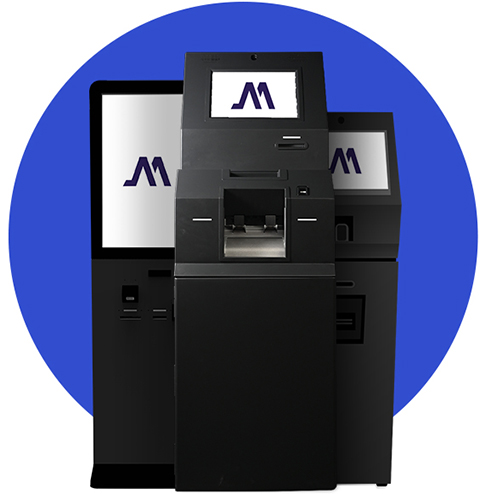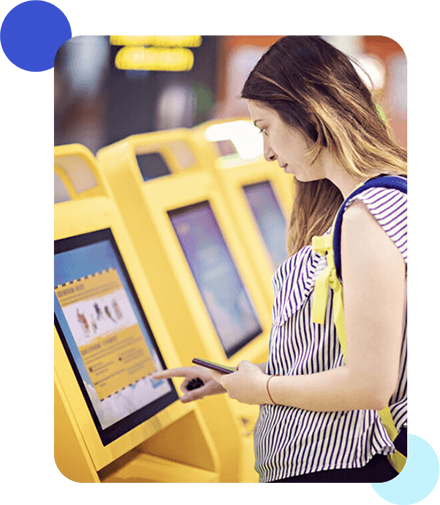
What is a Self-Service KIosk?
Self-service kiosks have emerged as game-changers, redefining the way customers interact with businesses. A self-service kiosk can be an interactive tablet or touchscreen computer that allows a customer to access information or services without directly interacting with a person.
What sets self-service kiosks apart is their ability to automate transactions through tailored kiosk solutions. These kiosks have user-friendly interfaces that enable customers to execute the required tasks effortlessly.
Self Service Machine Solutions by Wavetec
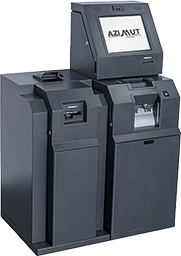
Self Service Kiosk for Banking & Cash Management
Financial institutions adopt software solutions that integrate with self service kiosk machines and provide services like Account Opening, Instant Card Issuance, Cash and Cheque Deposit.

Self Service Kiosk for
Telecom
Wavetec’s SIM Dispensing Kiosk supports customers in registering for a new SIM card, topping-up mobile balance, or changing mobile package plans efficiently and remotely.
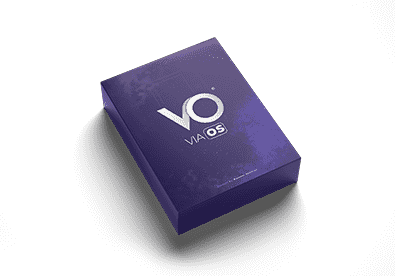
Smart Intergration With
ViaOS
ViaOS helps integrate the current on-ground systems with real-time dashboards, BI tools, and advanced software features that can simplify the entire process.
Types of Self Service Kiosks
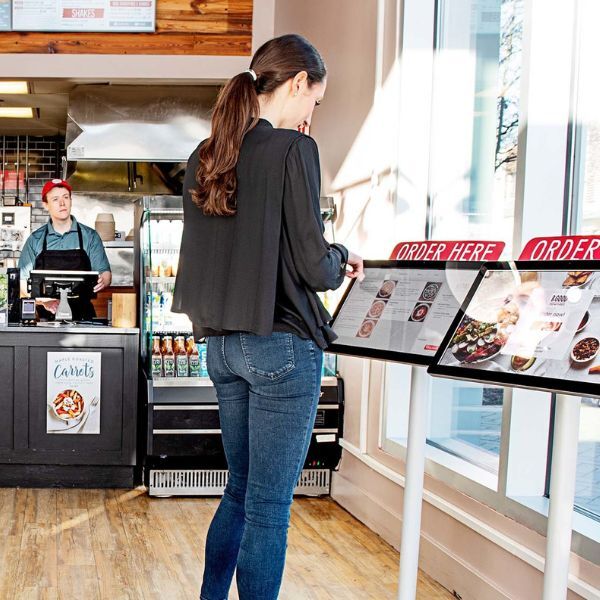
Quick Service Restaurant Self-Service Kiosks
QSR or Quick Service Restaurant kiosks are essentially self ordering machines. These kiosks allow you to skip the lines and wait times and avoid any human interaction whatsoever. You can walk up to the kiosk, select your order at the large touchscreen, pay using a card or sometimes cash and then you simply wait for your food to be prepared and brought to you.
This self service technology has been around for some time, but only a few embraced it early on like McDonald’s, Subway, Taco Bell and Starbucks. Recently, more and more restaurants are investing in self service to enhance customer experience by offering alternate channels of service delivery.
Self Checkout Kiosks
Self-checkout kiosk enables a customer to perform their checkout independently without intervention by a cashier or bagger. These machines are found in large supermarkets and are easy to navigate. They also have multiple payment options like cash, card, or mobile wallet.
This kind of kiosk is very common in some parts of the world, like North America, which has a massive network of department stores like Walmart, Target, Best Buy, etc. These larger companies have been able to invest in the technology because they operate at such a large scale that these expensive machines end up being quite cost-effective for them.
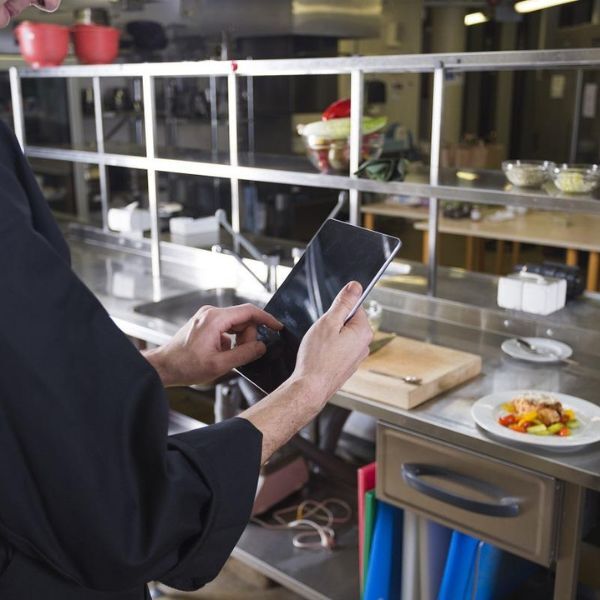
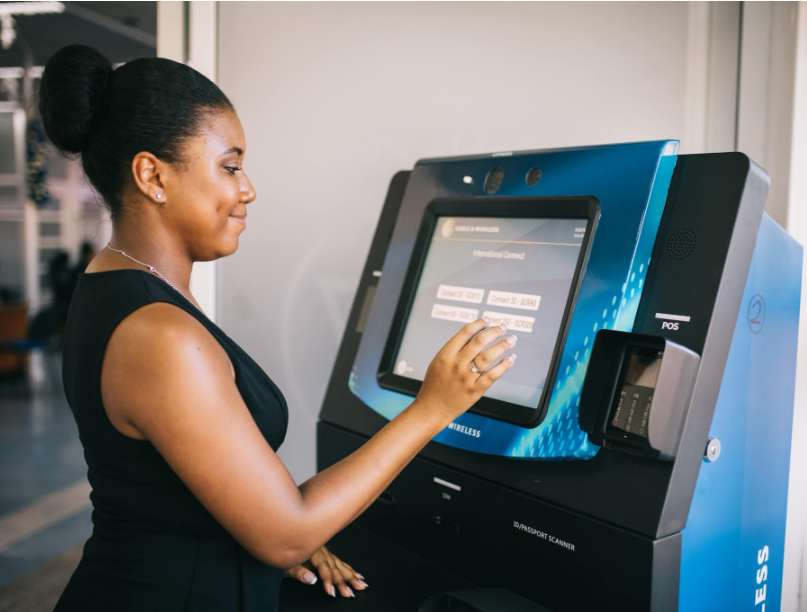
Sim Dispensing Kiosks
What is the first thing you do when you get off an airplane in a foreign country?
You seek connectivity, be it in the form of a SIM card or a Wi-Fi connection. SIM dispensing kiosks became a necessity in popular tourism or business destinations. They are conveniently installed in airports, shopping malls and commercial parks for increased accessibility.
The kiosks help telecoms implement SIM card registration in a much more efficient manner and allow customers to purchase and register a SIM card at any time of the day instead of just between 9 am and 5 pm
Cash & Check Deposit Kiosks
The inception of electronic kiosks shares the same roots as the ATM; bank customers demanded the ability to perform deposits outside of banking hours. Cash deposit kiosks or machines (CDMs) are already quite popular in some regions, however a lot of other nations have been slow in their adoption of the technology.
The automation of cash and check deposits clears up a lot of time at cash counters in banks; employees don’t have to enter data, count currency notes or verify information manually
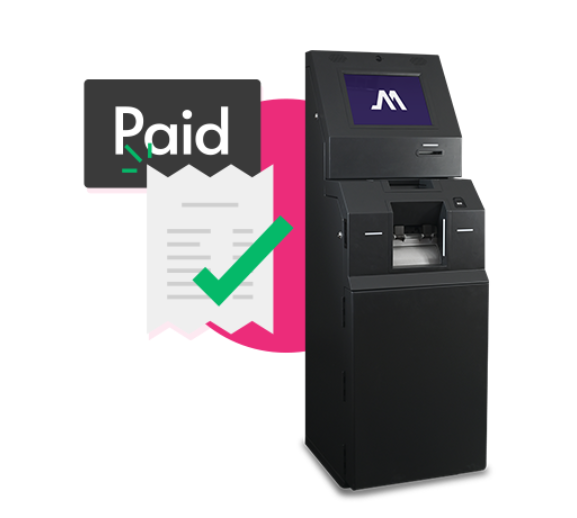
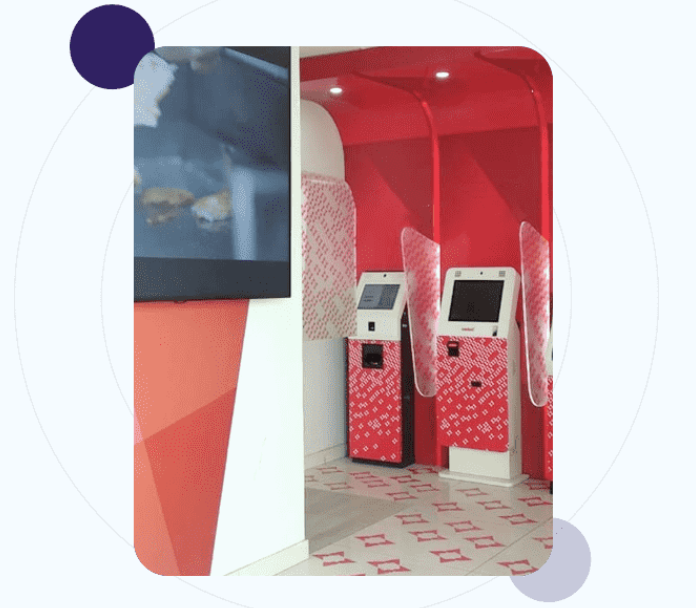
Card Issuance Kiosks
These kiosks are similar to telecom SIM dispensing kiosks; they have the capability to perform full KYC checks, register new customers, and activate & dispense a card.
These kiosks are being used by governments, educational institutes, libraries, supermarkets, etc.
How Are Self-Service Kiosks Used in Different Industries
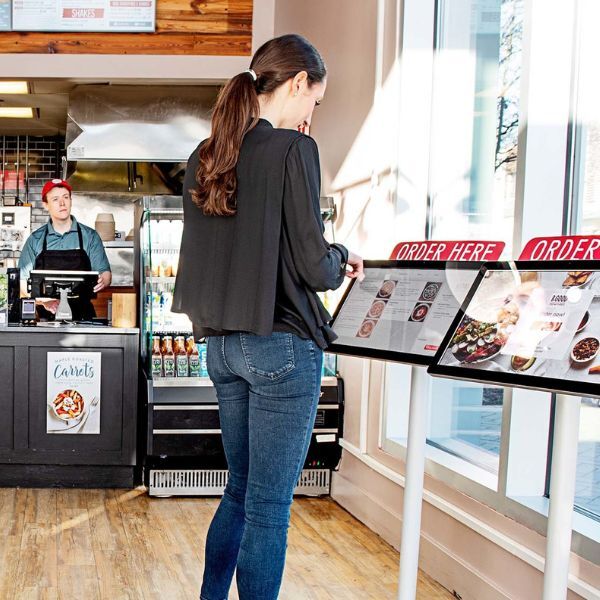
Restaurants
Self-service kiosks have revolutionized the restaurant industry by providing customers with a user-friendly interface to browse menus, place orders, and make secure payments.
Integrated with a Point of Sale (POS) system and Menu Management System, these kiosks ensure accurate order processing and real-time updates on menu items and prices. Order details are seamlessly transmitted to the kitchen through a Kitchen Display System (KDS), optimizing kitchen workflow.
Self-service restaurant kiosks enhance customer experience and streamline restaurant operations, making them a valuable asset in the modern dining landscape.

Telecom
Self-service telecom kiosks streamline user access to essential services. Operated in collaboration with telecom providers, these kiosks offer prepaid plans, top-ups, and SIM card dispensing.
Payment processors facilitate secure transactions, while customer identification systems ensure compliance. User-friendly touchscreens supported by specialized software enable easy navigation.

Bank
Self-service bank kiosks revolutionize the banking industry by providing users with swift, secure, and convenient access to a myriad of financial services.
Integrated with advanced banking software and ATM networks, these kiosks enable users to perform transactions, from balance inquiries to cash withdrawals, with the aid of card readers and biometric authentication. Receipt printing systems offer transaction records, while robust security measures protect user information, including surveillance and anti-skimming technologies.
- Restaurants
-

Restaurants
Self-service kiosks have revolutionized the restaurant industry by providing customers with a user-friendly interface to browse menus, place orders, and make secure payments.
Integrated with a Point of Sale (POS) system and Menu Management System, these kiosks ensure accurate order processing and real-time updates on menu items and prices. Order details are seamlessly transmitted to the kitchen through a Kitchen Display System (KDS), optimizing kitchen workflow.
Self-service restaurant kiosks enhance customer experience and streamline restaurant operations, making them a valuable asset in the modern dining landscape.
- Telecom
-

Telecom
Self-service telecom kiosks streamline user access to essential services. Operated in collaboration with telecom providers, these kiosks offer prepaid plans, top-ups, and SIM card dispensing.
Payment processors facilitate secure transactions, while customer identification systems ensure compliance. User-friendly touchscreens supported by specialized software enable easy navigation.
- Bank
-

Bank
Self-service bank kiosks revolutionize the banking industry by providing users with swift, secure, and convenient access to a myriad of financial services.
Integrated with advanced banking software and ATM networks, these kiosks enable users to perform transactions, from balance inquiries to cash withdrawals, with the aid of card readers and biometric authentication. Receipt printing systems offer transaction records, while robust security measures protect user information, including surveillance and anti-skimming technologies.
Benefits of Self-Service Automated Kiosks
Wavetec Has Helped 100+ Brands Reduce Wait Times
Improve Customer Experience With Self Service Machines

We are using data and technology
in unexpected and brilliant ways to transform customer experience around the globe
![]()
Intuitive Layout
Advanced and intuitive interface for a smoother experience with multiple service options
![]()
Integrative Capacity
Can seamlessly integrate with third- party apps and back-end systems
![]()
Customization
Hardware & Application can be customized as per requirements.
![]()
24/7 Service
Operational capability to serve customers 24/7

Find Out How Wavetec Can Help You Increase Customer Satisfaction With Its Proven Self Service Products
Your Questions, Answered!
Frequent questions we get regarding Self Service Kiosks
Self-service solutions are those that provide consumers and employees with tools and information which they can utilize to find answers to their questions, service their specific needs and have a wholly improved encounter with a product or service. Premised on the service/product promised and its delivery, self service is a means of helping the client help themselves.
These solutions are geared towards giving your business the competitive edge it needs to accelerate client onboarding cost effectively and with increased profits.
Self-service kiosks are designed differently to withstand the environmental factors of being placed outside. In these instances, the structures must be designed and engineered to be weather-resistant, secure, durable, and safe for all outdoor conditions.
Self service is an evolved form of customer service. In a post-pandemic world, social distancing and contactless solutions have gained popularity. Safety included, customers also dislike a long and tedious wait, and prefer a seamless and frictionless process.
They know what they need and would prefer to avail of it without unnecessary contact and interactions. Self service kiosks take all these concerns into account when offering their innumerable solutions. Additionally the data collected during this process is utilized by the company in question to improve the visitor management further. The modern client needs self service.
Yes! While self-service kiosks have been highly used in the QSR industry, countless other industries can utilize the benefits of this technology, too. From wayfinding to registration capabilities, self-service kiosks offer unlimited opportunities for other industries like automotive, grocery, home improvement, retail, hospitality, cannabis dispensaries, etc.
There are various payment options available for kiosks, and which ones to utilize depends on a business’ needs. Self-service kiosks offer a” pay at the corner” option for those customers who pay with cash and also accept credit cards in many restaurants. In addition, increasing numbers of QSRs and fast casuals are experimenting with kiosk programs that can dispense cash to eliminate the need for patrons to take their orders at the counter.
- Retail – supermarkets, clothing stores, household stores
- Banks
- Telecom
- Airlines and Airports
- Government/Public offices
- Restaurants
- Schools/ Universities
- Healthcare
- Corporate
- Transportation
Fortunately, many kiosk software providers have open APIs that can work with a variety of point-of-sale systems, making them perfectly capable of connecting with different systems. The only caveat might be if a POS system itself is not available to interfacing with other software programs.

